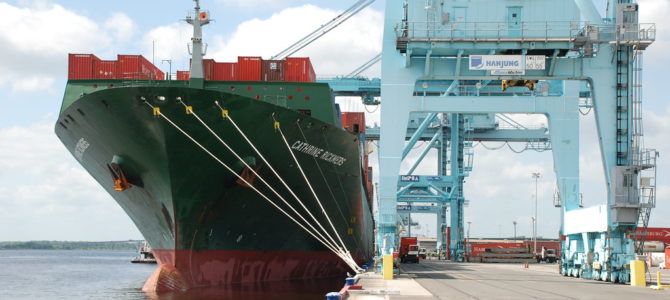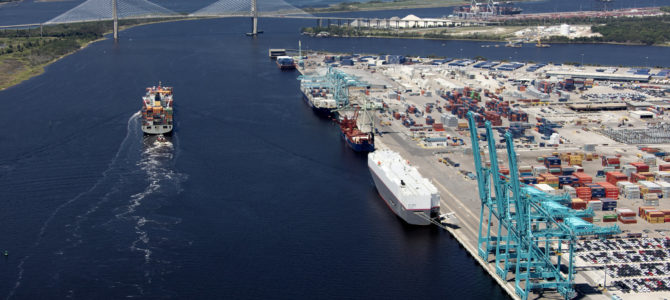
President Trump’s tariff policies have exercised conservatives to no end over the last few years. They’ve expressed two primary viewpoints.
On the one hand, zealous pro-tariff advocates have embraced the insupportable position that tariffs are economically beneficial. On the other hand, free trade advocates have repeatedly pointed out the well-established fact that tariffs are economically harmful, thus concluding they should be eschewed. Trump’s threat to impose a 5 percent tariff on Mexico unless that country takes steps to prevent illegal immigration has recently poured new fire on the debate.
Both sides of the argument, however, share a common flaw: They have almost universally assumed that whether tariffs should be imposed is an economic question. It is not. It is a political one.
Economic growth or efficiency is a good end that government should promote. But it is one end among many. A more nuanced approach to the question is required—one that takes all of the relevant factors into consideration.
An Epiphany
Several months ago, a column in The Public Discourse took a hammer to this “economics only” view of tariffs. James E. Hartley’s article, “Just Tariff Theory,” began by acknowledging that tariffs are economically harmful. Economists are as unanimous on this question as they ever get, and for good reason.
Free trade only takes place when both parties to the trade benefit—that is why they decide to trade. Restricting free trade, therefore, by definition makes both parties worse off. There are qualifications—when the traders are children or mentally handicapped, for example, or when the goods involved are morally charged—but those are not at issue here. Tariffs are harmful because they are taxes that burden free trade.
Tariffs hurt foreign sellers because they must sell fewer goods at a higher price or cut into their profits to pay the new tax (in practice it will be some of both). American buyers are harmed because they must buy fewer goods at that new higher price. American sellers benefit because they can sell at a higher price, but they only benefit at the expense of American buyers, so the benefit even for Americans is at best a wash.
But Hartley describes an important “epiphany.” In the midst of a disgruntled reaction to the news of a new tariff to be imposed on Turkey, he was startled by the justification given for it. The purpose was not to obtain some mythical economic benefit, but to apply pressure for the release of an imprisoned American pastor.
The epiphany: Tariffs can serve non-economic purposes. As such, although economically harmful, they can sometimes be used to gain political advantages that outweigh their economic costs.
War is the classic instrument of foreign policy. It is economically harmful, but sometimes justified to achieve noneconomic goals. Like war, tariffs impose economic costs, but can also be useful—and less drastic—instruments to apply international pressure.
That pressure can be used to achieve worthwhile foreign policy goals—in this case, the liberation of an American citizen. They could also be a short-term strategy to achieve a longer-term strategy of lower trade barriers on both sides. Tariffs are economically bad, but it does not follow that tariffs are bad. Hartley goes on to sketch a basic theory for when tariffs may be an appropriate geopolitical tool.
Extending the Observation
Foreign policy is just a special case, however, of a more general principle: Tariffs can be justified when they do more good than harm. The economic impact of a tariff is a relevant consideration, but so are other, noneconomic goods.
What might such considerations look like? One of the most famous is the vital industry justification. If a given industry is particularly vital to a nation’s security, it may well be worth protecting it from international trade. During peace time the results will be suboptimal. But should war strike, the nation will have the capacity to defend itself.
An ongoing small economic ill is accepted in return for the security of a great political good. This argument has been made in defense of Trump’s steel tariffs. How plausible such a claim is in that particular case is a legitimate question. The theory itself, however, is perfectly valid.
Another example deserves far more attention than it has received: Tariffs may well be the best form of welfare from a conservative standpoint. Consider: Economic models assume that all human beings are fully rational maximizers of their own economic benefit—if a person’s industry is superseded by foreign imports, that person will switch to a different industry and continue to work productively.
In real life, however, some individuals are less than fully rational, and others are, for non-economic reasons, attached to ways of life that do not comport with such mobility. A 50-year-old factory worker permanently laid off in the Midwest is unlikely to go back to school to retrain as a data analyst in California.
Long-term unemployment is a real phenomenon, and there is no debate in this country, at least practically speaking, that government welfare will be available to assist those who have fallen on hard times. It will be offered. The only question is how. Most of us consider that a morally good thing.
That means there may be another argument in favor of certain tariffs. If some tariffs can serve as a form of welfare, replacing transfer payments with jobs, and thus avoiding many of the dependency-related problems that accompany direct aid, they may prove to be a healthy policy solution in an imperfect world.
The possibility of putting a significant portion of our unemployed back to work and allowing them the dignity of self-support (with a small boost from government policy) is a political good that must be seriously weighed against the benefits of a freer trade environment.
If the question is what kind of welfare is going to be offered, might this not be the best kind? (On the flip side, of course, it must also be taken into consideration that this will typically harm workers in other countries who are even worse off than those protected in the United States.)
Finally, high-minded principle should not distract us from the role of prudence in practical politics. In the right circumstances, even support for an overall negative tariff can be perfectly rational—and even moral. If that support is a necessary part of a larger political program that advances the common good, it may be worthwhile.
Or, to put the matter bluntly: all politics involves compromise. If a statesman has the opportunity to support a bad tariff in exchange for a counterbalancing good, it may well be right to do so. The greater good, as well as security and societal health, may justify support for a tariff in some circumstances.
A New Framework for the Debate
The purpose of this article is not to defend the Mexico tariffs specifically, or any of Trump’s tariffs, for that matter. It is simply to suggest a more adequate framework for the debate over tariff policy. We must remember that every political question—including about whether a given tariff is justified—involves balancing all the costs and benefits involved, not just the economic ones.
On the one hand, we can take for granted that tariffs are always economically harmful—except, of course, that even from an economic perspective they can be beneficial if used as a temporary negotiating tool to get other countries to, say, lower their own tariffs. On the other hand, we must remember that there is more to life than economics. The political goods that a tariff may achieve must be taken into consideration when deciding whether it is justified.
Those who think illegal immigration is a problem will be interested to know that Mexico has already professed willingness to help curb it in order to avoid Trump’s threatened trade penalty. Thinking in these more political terms nuanced terms is vital if the United States is to adequately pursue its interest and duty in the area of tariff policy.









